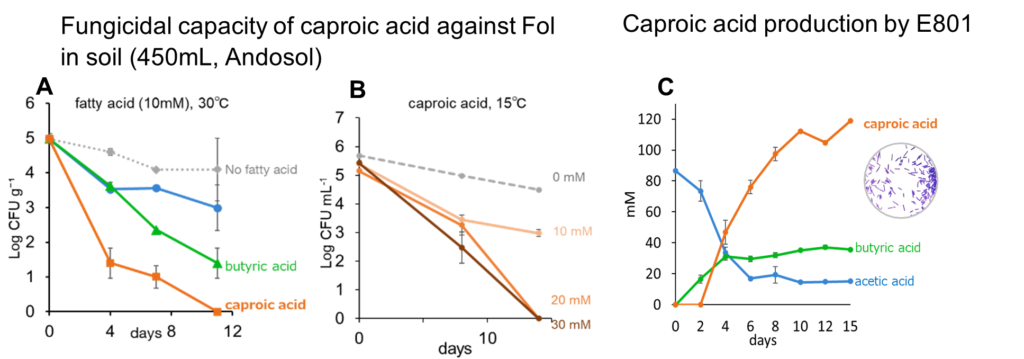Advantages
- Identifies the active ingredients of the soil reduction disinfestation method (Anaerobic Soil Disinfestation: ASD).
- Leads to time and cost savings over conventional ASD and provides stable soil disinfection regardless of climate or season.
- Can also be commercialized using identified anaerobic bacteria (Clostridium E801)
Technology Overview & Background
Soil contamination by plant pathogens such as filamentous fungi is known as one of the soil disorders caused by continuous cropping. Soil disinfection using fumigants such as chloropicrin has been used during field fallow periods as a response to the continuous cropping disorder. But it is now strictly regulated due to concerns about its impact on the environment and human health. Soil reduction disinfection (ASD) has been adopted as a disinfection method with less environmental impact; ASD is a disinfection method in which fields are irrigated with a mixture of organic matter and the surface is covered with a film, which activates anaerobic bacteria in the soil and kills soil pathogens as the soil is reduced. However, the detailed disinfection mechanism of ASD has not been clarified, and its effectiveness is unstable under low-temperature conditions, such as in high latitudes, and it is costly and involves many work processes.
The inventor succeeded in isolating an anaerobic bacterium that is dominant in ASD and identifying its disinfection factor. Through replicated experiments of ASD, he isolated strain E801 of Clostridium sp. which is an anaerobic bacterium specific to soil after ASD, and found that caproic acid produced by strain E801 inhibits the growth of Fusarium oxysporum f. sp. lycopersici (Fol), which is one of the causal bacteria of soil injury during continuous cropping of tomatoes. Caproic acid showed stable fungicidal effects even at low temperatures, and was also effective against Ralstonia solanacearum, one of the plant pathogenic bacteria. In addition, when caproic acid was added to soil, its fungicidal effect was confirmed against Fol (see figure (A) below, 30°C). If caproic acid can be produced from strain E801 at low cost through fermentation, it is expected to become a stable, inexpensive, and simple soil disinfection method that can be applied directly to soil, even under low temperatures.
Data
 |
- The bactericidal effect of caproic acid was confirmed when each fatty acid (10 mM) (A) , and each concentration of caproic acid (B) was added to 450 ml volume of black box soil with Fol present and allowed to stand at 30°C (A) or 15°C (B).
- Production volume of caproic acid and butyric acid (C) when ethanol and acetic acid were used as starting materials for fermentation production in strain E801.
Patents
Patent pending (not yet published).
Principal Investigator & Academic Institution
Dr. Seigo Amachi (Professor, Graduate School of Horticulture, Chiba University)
Development Stages
- Effect of caproic acid on Fol has been confirmed in soil at laboratory level and is being tested in pots planted with tomatoes.
- Effects of caproic acid on Fol and Ralstonia solanacearum have been confirmed at low temperatures by testing in culture medium.
Expectations
We would like to collaborate with (1) companies that are willing to cooperate with us in field trials to demonstrate the effects of caproic acid and strain E801, and (2) companies with fermentation and production technologies that are willing to collaboratively develop a system to produce caproic acid using strain E801 for the practical application and commercialization of the invention.In addition to the disclosure of unpublished data, etc., through the signing of a nondisclosure agreement, we can also arrange a meeting with Prof. Amachi.
Project No. WL-04781


